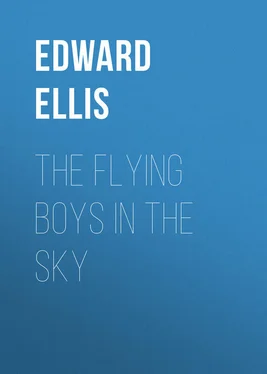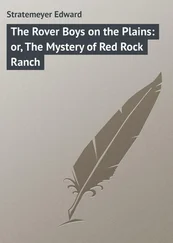Edward Ellis - The Flying Boys in the Sky
Здесь есть возможность читать онлайн «Edward Ellis - The Flying Boys in the Sky» — ознакомительный отрывок электронной книги совершенно бесплатно, а после прочтения отрывка купить полную версию. В некоторых случаях можно слушать аудио, скачать через торрент в формате fb2 и присутствует краткое содержание. ISBN: , Жанр: foreign_prose, на английском языке. Описание произведения, (предисловие) а так же отзывы посетителей доступны на портале библиотеки ЛибКат.
- Название:The Flying Boys in the Sky
- Автор:
- Жанр:
- Год:неизвестен
- ISBN:http://www.gutenberg.org/ebooks/50823
- Рейтинг книги:3 / 5. Голосов: 1
-
Избранное:Добавить в избранное
- Отзывы:
-
Ваша оценка:
- 60
- 1
- 2
- 3
- 4
- 5
The Flying Boys in the Sky: краткое содержание, описание и аннотация
Предлагаем к чтению аннотацию, описание, краткое содержание или предисловие (зависит от того, что написал сам автор книги «The Flying Boys in the Sky»). Если вы не нашли необходимую информацию о книге — напишите в комментариях, мы постараемся отыскать её.
The Flying Boys in the Sky — читать онлайн ознакомительный отрывок
Ниже представлен текст книги, разбитый по страницам. Система сохранения места последней прочитанной страницы, позволяет с удобством читать онлайн бесплатно книгу «The Flying Boys in the Sky», без необходимости каждый раз заново искать на чём Вы остановились. Поставьте закладку, и сможете в любой момент перейти на страницу, на которой закончили чтение.
Интервал:
Закладка:
“How do you do, sir?”
The voice would have won an engagement for the owner as the basso profundo in an opera troupe. It was like the muttering of thunder, and as Abisha Wharton expressed it, seemed to come from his shoes.
Since Wharton left it to his young friend to do the honors, Harvey, pausing a few paces away, exerted himself to play the host.
“I see that your machine is a monoplane; you seem to have it under good control.”
“Why shouldn’t I? I made every part of it.”
“Even to the searchlight?”
“Of course; is that biplane yours?”
“It is; we landed several hours ago, having been kindly furnished a meal and lodgings for the night. I presume you will keep us company; my friend here, I am sure, will be glad to do what he can for you.”
“Kerrect,” added Wharton; “you’re as welcome as the flowers in spring.”
“Don’t you travel by night?” asked the visitor, ignoring the invitation.
“Not when I can avoid it; it is too risky to land in the darkness.”
“Night is the favorite period with me.”
“But you can’t keep in the air all the time.”
“What do you know about it, young man?” asked the other in his sepulchral tones; “I don’t expect to make a landing till after sunrise to-morrow.”
“I never heard of such a thing.”
“There are lots of things you never heard of; I built this monoplane, without help from any one; it embodies a number of new principles, one of which is the ability to keep in the air for twelve hours without renewing the gasoline; I mix a certain chemical with that fluid which increases its power tenfold; I shall not rest until it is multiplied a hundred times.”
“You have an invention that will make you wealthier than Carnegie or Rockefeller.”
“I’m not seeking wealth,” said the other sourly, as if not pleased with the suggestion; “there are better things in life than riches.”
“All the same, it’s mighty pleasant to have them,” replied Harvey, nettled as much by the manner as by the words of the stranger.
“See here,” interposed the hospitable Wharton; “we are keeping you standing – ”
“There is no compulsion about it, sir; I am doing what pleases me best.”
“Will you walk into my house and have something to eat? There isn’t much style about us, but my wife will give you a good cup of coffee and some corn bread and fried chicken.”
“I’ll go to your house, but I’ll not eat for I’m not hungry.”
Wharton led the way to the porch. Harvey, who was curious to learn more of this strange individual, deftly placed his chair so that the rays from the candle fell through the open window upon him. In obedience to the youth’s order, Bohunkus brought out a fourth stool, so that all were seated, the woman of the house remaining inside and attending to her duties, as if she felt no interest in what was going on.
The negro sat close to his companion and huskily whispered:
“Am he de feller dat rid down on de comet?”
“Bunk, the best thing you can do is to keep still and listen; our conversation is likely to be above your head.”
“Jest like de comet; all right; I ain’t saying nuffin.”
A part of the yellow rays touched Harvey, and the stranger turned and scrutinized him as if impelled by curiosity similar to that of the youth. The movement revealed the visitor’s face plainly, and it may be said it was in keeping with the impression he had already made. He wore a motorman’s cap, and a long, linen duster, buttoned to the chin and reaching downward to his slim tan shoes. What clothing was within this envelope was out of sight.
The face was long and covered with a grizzled beard that reached well down on his breast. He had removed his buckskin gloves, crossed his legs, and placed one of the hand coverings in his lap, while he loosely grasped the other and idly flipped the first with it as he talked.
But his eyes were the most striking feature of the remarkable man. They were overhung by shaggy brows, were of a piercing black color, and glowed as if with fire. Their startling glare caused a sudden suspicion in the mind of Harvey Hamilton that the man was partially insane. At least, he must be the curious individual best described by the word “crank,” one whom much study and research had made mad. As is well known, such a person often succeeds in hiding his affliction from his friends, or gains the reputation of being simply eccentric.
“What is your name and why are you here?” he abruptly asked, still looking in the face of Harvey, who said he lived at Mootsport, something more than a hundred miles distant.
“I have started on an outing with my colored friend, without any particular destination in view; when we have had enough sport, we shall return. Who are you?” queried the youth, feeling warranted in asking a few equally pointed questions.
“My name is Milo Morgan; I have no special home, but stop where the notion takes me; my business is invention, as it relates to the aeroplane.”
“May I ask what improvements you have made, Professor?”
He hesitated a moment as if uncertain what to reply.
“Not half as many as I am sure of making in the near future. The rigging of a searchlight cannot be called an invention, for it has long been in common use on warships and others, and all aeroplanes are supplied with electricity. I have rigged up a wireless telegraph, so as to pick out messages from the air; I have succeeded in compounding a fluid which as I told you is ten times stronger than gasoline; I run without noise, and my uplifter will carry me vertically upward, as high as I care to go.”
“I should think you were blamed near the limit,” suggested Abisha Wharton, profoundly interested in what the Professor was saying.
“I have only begun; and I intend to justify the name of my monoplane.”
“I didn’t hear it.”
“Because I haven’t spoken it, but when you have a daylight view of my machine you will see the name painted on the under side of the wings, ‘The Dragon of the Skies.’”
This was said with so much solemnity that Harvey had hard work to hide his smile. He no longer doubted that he was talking with a crank.
“Do you mind telling me what is the great object you have in view?”
“It is to build a machine that will keep afloat and travel at an average speed of sixty miles an hour, – probably greater. That will enable me to cross the Atlantic in a little more than two days and I shall have no difficulty in sailing to Asia or Africa.”
CHAPTER VIII
THE PROFESSOR TALKS ON AVIATION
The last remark of Professor Morgan threw Bohunkus Johnson into a state of excitement. He had obeyed Harvey and remained mute during the conversation, but he now addressed the visitor directly:
“Did yo’ say Afriky, boss?”
The man looked in his direction and nodded his head.
“That’s what I said, sir.”
“Dat’s where my fader libs.”
Harvey felt it his duty to explain:
“My colored friend claims to be the son of a distinguished African chief, whom he hopes to visit some day.”
“What is the name of the chief?” asked the Professor.
“His given name is the same as his; the full name is Bohunkus Foozleum.”
“I can’t say I ever heard of him,” remarked the Professor without cracking a smile.
“I sent him a letter a month ago, in de care ob Colonel Roosevelt and it’s ’bout time I got an answer. I’m sure de Colonel will call on him while he’s hunting in Afriky.”
“Well, when my machine is perfected, I’ll take you with me and it sha’n’t cost you a penny,” said Professor Morgan.
Bohunkus chuckled with delight and settled down to listen. The visitor now ignored him and addressed the others.
Читать дальшеИнтервал:
Закладка:
Похожие книги на «The Flying Boys in the Sky»
Представляем Вашему вниманию похожие книги на «The Flying Boys in the Sky» списком для выбора. Мы отобрали схожую по названию и смыслу литературу в надежде предоставить читателям больше вариантов отыскать новые, интересные, ещё непрочитанные произведения.
Обсуждение, отзывы о книге «The Flying Boys in the Sky» и просто собственные мнения читателей. Оставьте ваши комментарии, напишите, что Вы думаете о произведении, его смысле или главных героях. Укажите что конкретно понравилось, а что нет, и почему Вы так считаете.










![Edward Ellis - Adrift on the Pacific - A Boys [sic] Story of the Sea and its Perils](/books/753342/edward-ellis-adrift-on-the-pacific-a-boys-sic-s-thumb.webp)

